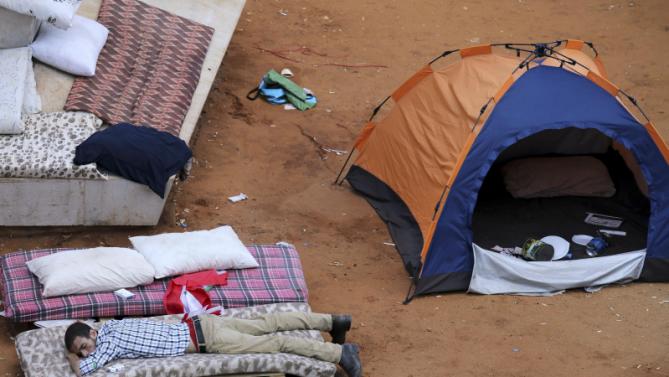
A Lebanese anti-government protester sleeps outside a tent set up for a sit-in against the ongoing garbage crisis and the government corruption, in front of the government house in downtown Beirut, Lebanon, Monday, Sept. 21, 2015
The Lebanese business community can’t have it both ways. Let me explain. Last Thursday, the Beirut Traders Association waded into the two-month dispute between the government and civil society activists, which began with the state’s inability to process Beirut’s rubbish, and then moved on to the wider issue of corruption, the absence of a president and the urgent need for parliamentary elections.
And what did the traders want? Well, basically they wanted the protesters to go home and rethink their strategy because, despite conceding that they did indeed have legitimate grievances, they were, as Nicolas Chammas, the association head, couched it, “voicing social demands at the expense of the economy”.
Meanwhile, Nasser Chammaa, the chairman and general manager of Solidere, the company tasked with rebuilding and managing the Beirut Central District (BCD), had the gall to point out that the protests were “impeding the business of the commercial district in Downtown for both small and large merchants”.
So that’s the reason a sizeable chunk of the shops, restaurants and businesses in the now infamous commercial area, which in the early 2000s promised so much in terms of Lebanon’s post-war rehabilitation, have either closed or relocated? I’m not so sure. I would happily wager my mortgage on the fact that the economy has been in freefall since the summer of 2012, when Lebanon proved it was unable to insulate itself from the Syrian conflict, even while the mismanagement of the country began decades earlier.
I kept asking myself if Messrs Chammas and Chammaa really believed in improving the Lebanese business model why didn’t they simply echo the activists’ demands and also call for the government’s resignation?
To blame the young and mainly nonsectarian protesters who have not, as people initially predicted, gone away, is to pick on an easy target. It’s much harder to blame a powerful and unscrupulous political class that is hell bent on maintaining its various sectarian agendas; its relations with its various regional backers and its nefarious business interests that in many cases openly leech at the public purse. It is ludicrous to suggest that the blame for Lebanon’s crippled economy should be laid at the door of a bunch of idealistic hippies.
Is it their fault that Beirut (don’t ask about the rest of the country) now experiences up to eight hours of power cuts every day despite the national grid using up 20 per cent, or US$2.5 billion, of government spending? Is it their fault that over the past 25 years successive energy ministers have entered office with pledges to provide 24-hour power within two years and failed? And is it their fault that the lack of power has not only sent the cost of doing business in Lebanon into the stratosphere, but has also put paid to whatever hopes we had of attracting foreign investors?
And while we are on the subject, is it their fault that most Lebanese regularly run out of water and need to buy extra supplies from private contractors, even though, if it were harnessed correctly, we would have more than enough water to go around with some left over to sell to other less fortunate countries in the region?
Is it their fault that a huge chunk of government spending goes on servicing a public debt that runs at roughly 150 per cent of GDP and which is held by Lebanese banks that in many cases are owned by members of the political class?
This last gripe, I was reliably assured by a friend, was a “left wing argument”, as if recycling money from the national purse into the pockets of the establishment was a matter of ideology. My friend should have read a recent report issued by the Cairo-based Economic Research Forum by Jad Chaaban of the American University of Beirut, in which it was calculated that the various strata of Lebanon’s political class owns 45 per cent of the banking sector. Even a card-carrying free marketer such as myself has to acknowledge that it’s not cool when a small minority makes a tonne of money at the expense the Lebanese taxpayer.
All this may be new to the hipsters laying siege to the Grand Serail, but they surely have enough grievances to be getting on with. Of course it’s not their fault the economy is a car wreck. But it is a very Lebanese trait to not rock the boat – and the business leaders who called for the protesters to leave the street do not help one bit.
Michael Karam is a freelance writer who lives between Beirut and Brighton



